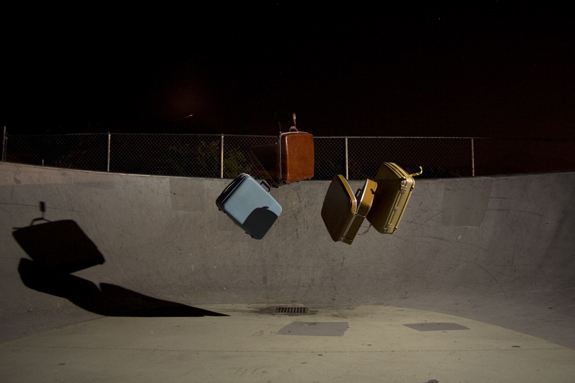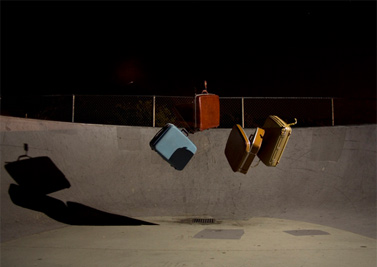
Yesterday, a tumbleweed blew right up to my driver’s side door, at a stoplight, here in Tucson. Simpson westbound, turning onto the highway frontage road north. I was alone at the light. Two hours prior, a hard decision, I turned down the offer of a three-year Visiting Poet position at a prominent creative writing MFA program a thousand miles away. I got out of the car, chased it a little ways in a subsequent gust, and then fit it into the backseat of my Mitsubishi, where it crumbled a bit in tight captivity. It was my lunch hour—I work a support position at an arts nonprofit downtown—and I brought it home with me. Later, my boyfriend John and I decided we would string it up as a chandelier in our living room. It’s December 21st and we’d been wondering whether we’d get a tree. What does it mean when the universal symbol of itinerancy knocks into you the day you committed to stay a while?
The flicker of the firelight will throw the tumbleweed’s shadow complexly on the ceiling is my hunch, giving the room a little twirl and flutter. I’ll suspend a tiny mirrored disco ball within it. One ornament spinning within another. I want to show it to John even more than I want to see it.
Visiting Poet is a volatile term, term after term.
When I met John’s father, Edmund, when he and his wife Diane, John’s mom, visited their son in Montana about this time two years ago, his first words to me, over the handshake, were: “So. Visiting. Poet?” I felt it as a challenge, just as twenty minutes later, when dinner was over, he’d outwit me to pay the check. He knew I had been John’s teacher, and I was uneasy in any misapprehension that our romance began when he was my student. I made sure to narrate the timeline as naturally as I could over our plates of river trout, and it was in that discernible anxiety I felt myself fall farther in Ed’s early estimation. It seems to me that of all his children, John is most like him: unpredictable conversationally, apt equally to quip obliquely or to wander off on his own in thought—a peppery kind of depressive, stubborn, quick enough to be disappointed in the world, good enough to prompt others to show him any flair for transcending the ordinary. John is made that way, too, except in his demeanor he is more graceful, more liquid, lovelier. It is clear that Edmund loves John supremely. A visiting poet, might by definition leave new relations by moving on, this visiting poet who presumably had upswept his son in poetry or something, his son whom he had known all twenty-nine years theretofore and had been unable to save from every hurt or letdown.
Visiting Poet is a volatile term, term after term. At Purchase College in 2002 I had my first “visiting professor” position and was called Writer-in-Residence. As I recall, it paid $3,500 to teach a single-semester poetry workshop. I rode the subway to the commuter rail at Grand Central to White Plains, where I caught a bus to Purchase to teach my two-hour weekly class. Then, at Pratt Institute of Art, I was Visiting Assistant Professor of Poetry, which was a designation beneath Adjunct and subject to more limiting union restrictions, although I was also advertised as Core Faculty. I taught two courses per semester and made around $14,000 per year and learned to collect unemployment in the summers, another six grand. I visited from a couple of neighborhoods away. For two of those three years, I lived in an SRO in Park Slope and still needed to supplement teaching income with freelance copy editing work. I moved to Los Angeles in 2006 and taught at both Cal Arts, where I was Visiting Faculty, and at Otis College of Art and Design, where I was Senior Lecturer, essentially an adjunct position, Core Faculty again. I averaged about $34,000 a year the two years I was in LA; it was the first time I had earned, in thousands, a salary greater than my age. When I moved to Montana to be Richard Hugo Visiting Poet and then, subsequently, Visiting Assistant Professor of Poetry (again), I was working less than I had in a while, but was finally, officially, full-time, also often referred to as Replacement Faculty during those three years another poet was on leave. I made some proportion of her salary, the most in my career: $52,000. I rented a whole house, I had insurance, I got therapy. In the last two years, I have been the runner-up for tenure-track positions at two universities, Hobart and William Smith Colleges and Depaul University. When the first didn’t come through, I took a high school program directorship, for $55,000, in Boston, which John and I endured only the one year. When I was passed over the second time, we moved to Tucson.
When I was little, tolerating re-runs of Gunsmoke or Bonanza on a sleepy Sunday after church with my grandparents in Virginia, or crushing excruciatingly on orphan Albert and his wet lips and eyes in Little House on the Prairie, on my own if I could arrange it, the tumbleweeds crossing the dusty main road were expressly incidental to the action, the epitome in fact of nature’s indifference.
We live on the western edge of town, in a sparsely developed area without streetlights at the foot of the Tucson Mountains, at the immediate margins of the Saguaro National Park. On the other side of Gates Pass, over the closest mountain, down a winding road, is Old Tucson Studios, the most recognizable set of buildings in American cinema and television, and the most widely exported visual idea of American frontierism. Most anything with a wagon wheel or stage coach or mercantile store or holster or headdress or petticoat was shot here. Certainly more formative impressions of tumbleweeds originated here than anywhere else.
When I was little, tolerating re-runs of Gunsmoke or Bonanza on a sleepy Sunday after church with my grandparents in Virginia, or crushing excruciatingly on orphan Albert and his wet lips and eyes in Little House on the Prairie, on my own if I could arrange it, the tumbleweeds crossing the dusty main road were expressly incidental to the action, the epitome in fact of nature’s indifference. As such, their desultory course through “town” could be used, directed, to lend whimsy or lonesomeness to the scene they were an integral part of setting. I assumed they were soft, fluffy, light enough to be carried on a breeze, like overgrown dust bunnies or dandelion heads maybe, but with more structural integrity. They rambled long distances, without disintegrating. On country radio in those early eighties, Juice Newton sang to the tumbleweed, stretching /weed/ into six syllables on the lilting melody. “You’re living a cowboy’s dream / freedom is the air you breathe…[but] you don’t stop long enough / to let yourself fall in love.” I live now among those incidental, airborne conclusions we all drew.
Tumbleweed is not a species, like ragweed or cinquefoil. There is, more likely, a tumbleweed genus, I’d imagine, a family of desert shrub that dries out in maturity and is eventually disunited at the narrow stem from its root system and rolls away in the first gust of many that motivates its final tour of earth, whereupon and only then it is known, in the singular form, as a tumbleweed. The tumbleweed is not soft, and not fluffy. This one, at least, has many barb-like thorns along its several long, fine, jointed limbs, and nearly as many crusted-over buds, long since flowered, though seeding may yet be a function of the tumbling afterlife of the bush gone polygon. As it rolls, the exoskeleton of the plant—which, in life, grew so intra-concerned because the tiny branches, by virtue of the stiff little thorns and offshoots, perverted the elongation of one another, bending ever inward—is further compressed and rounded by its overland travel. As an entity, however, the tumbleweed is not simplified during this reduction; this one has apparently ensnared and incorporated two or three stalks from similar plants it must have encountered. It is, while it rolls, entanglement amok.
When I started teaching at Pratt, it coincided with my breakup with Douglas, my longtime boyfriend in Brooklyn. When I left New York for Los Angeles, I left my ex-boyfriend Brett as well; I left him my apartment, my stereo and records, my bed, my rug. I wrote him letters from my new life. Both breakages were messy and incomplete, compounding the trauma of other separations I had made, wherein I had relied on my career—its demands and opportunities—to structurally necessitate or explain my absence or evacuation from someone or something, never offering the full account of self that would honor that relationship and my own needs, if indeed I understood them. To be in Montana meant separating and finally severing, after the protracted disenchantment of a long-distance partnership, from Doug in LA. I had thought then that commitment was what I needed to give greater effort; but, it was and has always been honesty about my own emotions that I owed to him, and others before him, and to my grandparents (who are weak, ill and dying now) and extended family to whom I have never revealed my adult self but have only moved farther away, to the city, to the west, into more remote territories of poetry and the academy (when it would have me), too incompletely realized to judge properly, too far to reject, too busy at Christmas to visit.
We have this one secured six feet above my head at the moment, suspended by its vestigial stem. The heat blowing from the highest air duct spins the tumbleweed counterclockwise, revolving the little mirror-plated orb within. John has just come in, after hours in his studio down the hall, to report that in a letter describing his own book project he “talked about time as a vessel for desire.” We do a small dance, a joint endeavor, before I finish my paragraph, having held my thought, or mingling it with another. “You writing?” he asks.
This piece is part of a series excerpted from Onesheets. You can read the rest of the series below.
Brian Blanchfield is the author of two full-length books of poetry: Not Even Then: Poems (New California Poetry), published in 2004 by University of California Press, and A Several World, to be published this coming March from Nightboat Books, as well as a chapbook, The History of Ideas, 1973-2012, forthcoming imminently. He lives in Tucson, Arizona.
The above work is from a collection of short, unresearched, disinhibited, single-subject essays called Onesheets. (The full working title is Onesheets: Brief Studies, Permitting Shame, Error and Guilt, Myself the Single Source.) Central to the go-it-alone, internet-off nature of the writing project is a suppression of the impulse to consult secondary sources, print or electronic, and on his own authority he gets a few things wrong. The collection has a rolling corrective endnote therefore. Relevant portions are offered here.

